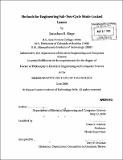Methods for engineering sub-two-cycle mode-locked lasers
Author(s)
Birge, Jonathan R. (Jonathan Richards)
DownloadFull printable version (25.41Mb)
Alternative title
Methods for engineering sub-2-cycle mode-locked lasers
Other Contributors
Massachusetts Institute of Technology. Dept. of Electrical Engineering and Computer Science.
Advisor
Franz X. Kärtner.
Terms of use
Metadata
Show full item recordAbstract
We begin by presenting a method to efficiently solve for the steady-state solution of a nonlinear cavity, suitable for simulating a solid-state femtosecond laser. The algorithm directly solves the periodic boundary value problem by using a preconditioned Krylov-Newton shooting solver. The method can be applied to the design and study of mode-locked lasers, as well as the modeling of field enhancement cavities, such as those used in high harmonic generation. In contrast to the standard approach of dynamic simulation, which converges linearly, our algorithm converges quadratically to the stable solution, typically converging two to three orders of magnitude faster than the standard approach. The second major theme is the control of dispersion in mode-locked lasers. The predominant way to design dispersion compensating optics in the past has been a consideration of the integrated net group delay dispersion (GDD). We propose and implement an alternative spectral quantity based on the energy contained in phase distortions, which we term the Phase Distortion Ratio (PDR). Dispersion compensating mirrors optimized with respect to PDR generally perform significantly better than those where GDD is optimized. We demonstrate this in the design of a dispersion compensating mirror pair capable of compressing single-single pulses. In the final section, we deal with the unique challenges inherent to measuring sub-two-cycle pulses reliably and accurately. We have recently developed a technique, Two-Dimensional spectral Shearing Interferometry (2DSI), based on spectral shearing, which requires no calibration and does not disperse the pulse being measured. (cont.) Our method intuitively encodes spectral group delay in a slowly changing fringe in a two-dimensional interferogram. This maximizes use of spectrometer resolution, allowing for complex phase spectra to be measured with high accuracy over extremely large bandwidths, potentially exceeding an octave. We believe that 2DSI is a uniquely cost effective and efficient method for accurately and reliably measuring few- and even single-cycle pulses. While the method is relatively recent, it is well tested and has been successfully demonstrated on several different lasers in two different groups, including one producing 4.9 fs pulses.
Description
Thesis (Ph. D.)--Massachusetts Institute of Technology, Dept. of Electrical Engineering and Computer Science, 2009. Cataloged from PDF version of thesis. Includes bibliographical references (p. 159-166).
Date issued
2009Department
Massachusetts Institute of Technology. Department of Electrical Engineering and Computer SciencePublisher
Massachusetts Institute of Technology
Keywords
Electrical Engineering and Computer Science.